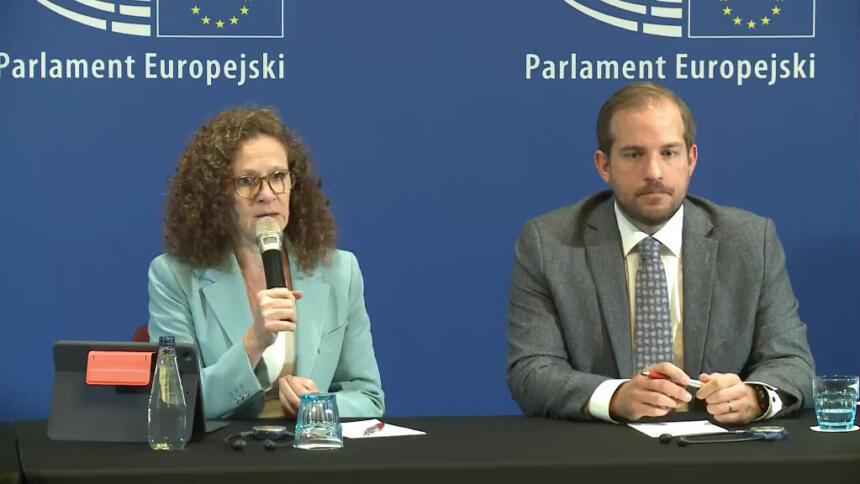Vom 19. bis zum 21. September 2022 war eine Delegation des Staatstrojaner-Ausschusses in Polen. Bei ihrem Besuch der polnischen Hauptstadt trafen sich die Abgeordneten unter anderem mit Oppositionellen und Journalist:innen, die mutmaßlich mit Staatsrojanern ausspioniert wurden.
Teil der Reise war dabei auch ein Treffen mit Mitgliedern des polnischen Untersuchungsausschusses, welcher sich aus Mitgliedern des polnischen Senats formiert. Die polnische Regierung dagegen ignorierte alle Einladungen der Parlamentarier:innen. Der Vorsitzende des PEGA-Ausschusses Jeroen Leanaers resümierte, dass der Einsatz von Staatstrojanern sowie der Umgang der polnischen Regierung mit gewählten Abgeordneten nichts weniger sei als die Missachtung von „entscheidenden demokratischen Standards und Bürgerrechten, die im polnischen und europäischen Recht verankert sind“. Ungewohnt deutlich fuhr der konservative Niederländer fort:
Und das ist eine weitere Dimension der Krise der Rechtsstaatlichkeit in Polen, denn im Kern geht es um Rechtsstaatlichkeit. Und ich möchte das unterstreichen, denn die Regierung – und sie ist nicht die einzige Regierung in Europa – versteckt sich hinter nationalen Sicherheitsbestimmungen, aber ich halte kein realistisches Szenario für möglich – und ich denke, meine Kollegen teilen das –, in dem die nationale Sicherheit es erfordert, hochinvasive Spionagesoftware wie Pegasus gegen Oppositionspolitiker, gegen Staatsanwälte, gegen Anwälte einzusetzen. Es geht also um Rechtsstaatlichkeit. Die Rechtsstaatlichkeit ist von entscheidender Bedeutung.
Ähnlich schockiert und frustriert äußerte sich Sophie in ’t Veld, die Berichterstatterin des Ausschusses:
Und was ich wie mein Kollege sehr besorgniserregend finde, ist die völlige Abwesenheit der Regierungsorgane und der Regierungsparteien in diesen Tagen, denn es mag politische Differenzen geben, aber wir dürfen uns niemals über die Grundlagen der Demokratie und der Rechtsstaatlichkeit unterscheiden. Denn wenn wir nicht dieselben haben, wenn wir nicht nach denselben Regeln spielen, dann ist die Demokratie praktisch tot.
Ging es nach ihr, solle die Kommission ein für alle Mal ihre „geht mich nichts an, ich will nichts Böses sehen und hören Einstellung“ ablegen, und anfangen, „europäische Gesetze wirklich durchzusetzen“.
Weil es kein vollständiges offizielles Transkript gibt, veröffentlichen wir hier ein inoffizielles.
- Date: 2022-09-21
- Institution: European Parliament
- Committee: PEGA
- Chair: Jeroen Lenaers
- Experts: Jeroen Lenaers (European People’s Party), Sophie in ’t Veld (Renew)
- Links: Video
- Note: This transcript is automated and unofficial, it will contain errors.
- Editor: Tim Wurster
Press Conference – MEPs Delegation of the PEGA Committee to Warsaw
Polish Official:Ladies and gentlemen, we are about to start a press conference, so please have your seats. The press conference will be broadcast live by some TV stations and also by the multimedia centre of the European Parliament. It will be broadcast live also at the Facebook channel of the Liaison Office of the Parliament in Poland. I will give the floor in a second to the chair of the Pega committee and to the rapporteur. The committee has been in Poland since Monday, investigating on the possibly abusive implementation of the software by the surveillance authorities, amongst others, in Poland. So now, Mr. Lenaers, the floor goes to you. You have a microphone on the table. You may take it off.
Jeroen Lenaers (Chair): Yes. Thank you. Thank you very much for that introduction. And thank you all for your interest in the work of our committee. Just to underline once more, we are a delegation of the Special Enquiry Committee of the European Parliament into the abuse of Pegasus and equivalent spyware in the European Union. We are here this week to investigate the situation in Poland. But as I said, our mandate covers the whole of the European Union. We were here with a delegation of ten members of the European Parliament from five different political parties and six nationalities.
Now, since we arrived in in Warsaw, our programme started about 48 hours ago. We had ten full-fledged hearings. We spoke to more than 40 interlocutors, including members of the Senate Extraordinary Committee on Pegasus, members of the same. We met with representatives of the Supreme Audit Office of the Ombudsman. We met with victims, with judges, prosecutors, journalists, experts in all fields. So, we had a very a very constructive and a very fruitful delegation visit here in the list of interlocutors I mentioned.
You will notice that we did not have any meetings with official representatives of the government. We had sent invitations to Minister Kamiński, to minister Ziobro, we had sent invitations to the Anti-Corruption Bureau and the data protection authorities. All of them were declined. It is regretful and we condemn the fact that the Polish authorities did not want to cooperate with our investigation committee. We think it also is a telling sign of the complete lack of importance. This government attaches to checks and balances, to democratic scrutiny, and to dialogue with elected representatives.
But as I underlined, even with the absence of meetings with the government, I think we had a very important and a very useful visit to Warsaw. And the occasions, the exchanges we had, I think, shed new light on the illegal use of intrusive spyware in Poland against Democratic actors. We see that the system of legal and institutional checks and balances has been dismantled to enable targeting individuals that are deemed opponents of the government. And as a result, crucial democratic standards and citizens’ rights enshrined in Polish and European law are grossly violated.
And this is yet another dimension of the crisis of rule of law in Poland because it is at its core about rule of law. And I would like to underline that because the government and it’s not the only government in Europe is hiding behind national security provisions, but there is no realistic scenario possible in my mind, and I think my colleagues share that, in which national security requires you to use highly invasive spyware such as Pegasus against opposition politicians, against prosecutors, against lawyers. So, it is about rule of law. The rule of law is crucially important.
We only have to look at Putin’s Russia today to give us a stark signal, a warning signal about what happens if you truly abandon all rule of law, all checks and balances and all democratic processes because democracy ceases to exist. And this should be a stark warning to us all to continue our fight to protect the rule of law in Poland and beyond, and to encourage all those actors in civil society and judges and academics here in Poland and in the rest of Europe who are fighting to fight for the rule of law every day to encourage those and to help them in that fight. Thank you very much.
Sophie in ’t Veld (Renew): Okay. Thank you. And also welcome on my behalf.
These have been very intense days. And I think that we all the members of the delegation or I should say all the members of the delegation who have been participating throughout the three days, because our colleague from the ECR Group has participated in one or two meetings, and we haven’t seen them any more since. But I think I will speak on behalf of all of us who have been there, that we come away from this visit very, very worried.
As my colleague said, this committee is in charge of investigating the illegitimate use of spyware throughout Europe, not just Pegasus, but also other brands. We note that spyware is being used by pretty much all governments or in all member states. But most member states would indeed use it in a very exceptional, targeted manner, embedded in a system of safeguards, oversight, scrutiny and what have you. But in some member states, like in Poland, there is clearly a case of spyware not being used for the security of citizens, but actually against citizens. And spyware, I would dare say, has become a tool for an authoritarian political agenda by the government parties, whereby all safeguards have been either eliminated, or they have been massacred to such an extent that they have become completely meaningless.
And what I find very worrying, like my colleague, is the total absence of the government bodies and government parties throughout these days, because there may be political differences, but we can never differ on the basics of democracy and the rule of law. Because if we don’t have the same, if we’re not playing by the same rules, then effectively democracy is dead.
Now, I will present my report early November, and of course, it will cover the entire European Union. But I can assure you there will be a very solid chapter on the situation in Poland. I think, last remark on Poland and then the European dimension, I’m very sad to say that after three days here, my expectations of remedies to be implemented by the current government are close to zero, if not zero. Because there’s clearly no political will, the fact that the system here is working against citizens is not by accident, is by design. And I find that extremely worrying.
I think that we will be making proposals for European standards, for the use of spyware, and that means that spyware can be used in a very limited number of very exceptional cases, duly justified by, or scrutinised by judges, monitored with all the necessary transparency, rights for victims and what have you. I think it’s not so difficult to come up with a set of proposals, but then it’s not enough to have legislation and standards. They also have to be applied.
And here I would like to also make an appeal to the European Commission because yes, it is true that national security is the exclusive domain of the member states. But it seems to me that and it was also alluded to by my colleague, that national security has become, you know, is the door to an area of lawlessness whereby member state governments say from this point onwards there is no scrutiny, no transparency, the rules don’t apply any more. And the European Union has nothing to say; that is unacceptable.
We all live in the European Union. We all have to respect the same values, and all European citizens are entitled to the same protection of their rights. So, I would urge the European Commission to let go of its, you know, none of my business see no evil, hear no evil attitude, and really enforce European laws.
We’ve been talking about e-Privacy, GDPR, Charter of Fundamental Rights and what have you. The same applies to Europol. I would like to reiterate my call for Europol to, if it is not invited by the governments to participate in investigations, to propose at its own initiative, to be associated to investigations. Because at least the presence of Europol would secure, you know, evidence, would secure a proper conduct of investigations, it would give a minimum level of protection.
And finally, my last remark, let’s not forget that Pegasus in this case there are also other brands with Pegasus has been manufactured and sold by a company called NSO Group a Marketing Licence, and an export licence has been granted by the Government of Israel, and they refused to basically cooperate and give us any information.
Why is it that we cannot say with certainty whether Poland was struck off the list of countries that that expert licences can be granted for? Why can we not say with certainty that Poland was one of the two countries of which the contracts have been terminated? Why is it that NSO is allowed to operate in the European Union, conduct its finances through Luxembourg, sell its products to now 12 member states products that have been used to violate the rights of European citizens and to attack democracy of the European Union. And yet, and Israel is not obliged to give us any information.
Israel is a friendly country. They’re an ally. I would expect the government to cooperate with us in the protection of our citizens. So, I would urge them to give that information immediately. Thank you.
Polish Official: Floor is now open for the question of journalists. Please raise your hand if you would like to take the floor and present yourself. Even if we know you and name the media you are representing. Please.
Warner Bros. Discovery [… inaudible; editor’s note] and Warner Bros. Discovery. I’d like to ask you, do you believe, or would your investigation impact the Polish government, Polish authorities in terms of clarifying this case? Maybe punish someone. Someone who’s responsible, of course.
Jeroen Lenaers (Chair): Sorry. The question is whether we feel that our investigation will encourage some sort of change in the Polish government’s attitude.
If I’m quite frankly, the fact that, at least the government refused to cooperate with us, refused to meet with us. I have to say, meeting many other interlocutors here in Poland this week, like the Senate extraordinary committee, like the representatives of the Supreme Audit Office; our investigation committee is not the only body that the government refuses to cooperate with. And the fact that it refuses to cooperate with anybody who dares to scrutinise the way this government is behaving does not give me any positive hope that our investigation will lead to a change in attitude by this government.
At the same time, it is our democratic duty, just as it is the democratic duty of members of the Senate, and also the same here in Poland to scrutinise government, to hold the executive to power. And we will not stop doing so. And we hope to make an impact in any way we can.
Sophie in ’t Veld (Renew): Maybe to add to that because I entirely agree and maybe I have very little hope that we’re going to change the attitude of the government, but there might be some MPs who have their own individual conscience.
But I think there’s also a message to citizens here because democracy in Poland is not isolated, it’s part of European democracy, which is our responsibility. And I can fully understand if people at this moment in time think, you know what, democracy, it’s not going to pay the rent or my electricity bill at the end of the month. But democracy and scrutiny of governments, control of governments, determine the quality of governance.
And I think in times of crisis, more than in any other time, we need to be able to hold governments to account, to scrutinise them and make sure that they’re going to do the right thing. Because this kind of authoritarian rule also means that there’s always a huge risk of corruption, and corruption is always at the expense of the most vulnerable citizens.
So, I think this is in everybody’s interest. And we will. Can we change this today? No. But we will keep it on the agenda. We will make sure it doesn’t go away.
RMF FM: [… inaudible; editor’s note] RMF. If I understood correctly, neither Israel nor NSO group provided this information. Uh, does Poland has this licence or it has been terminated. You don’t have this information. And the second question is: What was the worst case of violation of civil rights? Of just the law about this investigation.
Jeroen Lenaers (Chair): We visited the NSO group in July, and they confirmed that 14 EU member states had purchased the spyware and that the licences of two EU member states were revoked. They did not want to divulge which particular member states this were.
At the same time, like I said, we don’t have any concrete confirmation of this. At the same time, we know NSO group does not have any active, proactive checks and balances themselves. They act upon publications and media or information from whistle-blowers. At the point in time that we visited Israel, the only publicly available information on the use of Pegasus was in Poland, Hungary, and Spain. NSO itself said that they were not, or they were still investigating the situation in Spain themselves. So, it would seem odd to already revoke a licence that has already been still under investigation.
So logically, it would mean that Hungary and Poland would be amongst those two countries. But I say this is logical induction. It is not confirmed by NSO or the Israeli authorities.
On the second question, I think you have to be very careful in ranking infringements of human rights because any infringement, particularly with invasive spyware like Pegasus, any infringement is a ten out of ten if you want to use a scale. So, I don’t think we should differentiate between the level of infringement. There is no worst. There is no better. They’re all very bad.
Sophie in ’t Veld (Renew): And to add to that because on the one hand, there is, of course, the infringement of the rights of the individual, their right to privacy, etc. But here we’re also talking about undermining democracy, the chilling effect on journalists, the impact on election campaigns. So, it’s eroding our democracy, eating democracy from the from the insight. And that is something that we all suffer from.
Polish Journalist: Yes, hello. Yes, in Polish. I wanted to ask you after listening to all these comments and testimonies of people before you how you can point and help Poland also punish the people who are responsible for the surveillance also of opposition MPs before the election campaign. This is the first question.
Second question about whether you think that today Poland is a country under the rule of law and fully democratic. We after what you heard during the testimony of MPs but also leaders of social movements such as Michał Dziedziczak. Thank you very much.
Jeroen Lenaers (Chair): I think our role as an enquiry committee is to make sure that all the facts become publicly known, that we investigate the situation, but also to come up with conclusions and recommendations and then in the end, European legislation to make sure that governments in the European Union cannot abuse this kind of software in the future. And I think that is what our mandate is, and this is what we will do.
On your question, whether Poland is a free, democratic country where the rule of law. If you look at all the information, we have received in the past 48 hours, of course, we know that there is a rule of law crisis in Poland. We have plenty of European Court of Justice rulings that confirm this. We have the European Commission that has confirmed this on many levels. We have basically the Polish government itself confirming this by agreeing to the milestones of the European Commission. But knowing all this in the past 48 hours, I am more worried than I was before I arrived in Warsaw because there seems to really be a deliberate mechanism to dismantle checks and balances, to dismantle the rule of law, in order to serve political power. And in that sense, I am more concerned now than I was on Monday upon arriving in Warsaw.
Sophie in ’t Veld (Renew): Yeah. I think I can repeat what I said in my introduction. It is very clear that spyware here is not being used in a legitimate way for the security, the protection of citizens. It’s used as a political tool for an authoritarian agenda.
Because when we talked earlier about the violation of fundamental rights, it’s not just the privacy of individuals that has been violated. It’s not just that they’re being spied upon because the government is terribly interested in their private lives. The thing is that spyware is, you know, by those governments who are abusing it is used to collect information on a person in order to have power over the person, to blackmail a person, to intimidate, to maybe distorts the information, plant false evidence in order to accuse somebody, to discredit somebody. And that is actually, I think, the worst part, and that’s also the biggest risk.
And the thing is that I’m very pleased that the commission has announced that they’re going to launch a media, or they have launched the Media Freedom Act. We’ll start working on it now. And it contains a clause that bans the use of spyware on journalists. And that’s great.
But I think everything that is happening now in those countries, including Poland, where spyware is being abused, is already illegal. And I think the commission could already use existing legislation to tackle it. And I think the commission should be a lot more active because this affects not only Polish democracy, but it also affects democracy of the European Union as a whole. Because so also think about, you know, evidence obtained with spyware used by secret services.
For example, I hear that the law has been changed in such a way that evidence obtained in that way can be used. Well, I don’t think it can be used in any other country in the European Union in this way. What does that mean for police and justice cooperation in the European Union? So, if you’re talking about security, this is actually weakening the security of Polish citizens, not strengthening it.
RMF FM: [… inaudible; editor’s note] RMF again. You spoke about the influence of the spyware to elections. And then next year in parliament we have elections. And what’s the risk about this influence of using spyware, uh, to impact, to, to change the elections result. And speaking humanly, I heard, I heard unofficially that you were shocked listening to next and the next information you got in point. Was it like that? You were shocked about this all things?
Jeroen Lenaers (Chair): Like I said in response to the previous question, we, of course, all are aware of the situation in Poland, and yet we are now as a whole more worried than we were before. So, yes, there were shocking information that we gathered that we received here, and that will only encourage us, I think, to do our work even more passionately and more diligently on the elections.
I think definitely when spyware is used illegally against campaign leaders of the opposition, in this case in Poland, but also against prosecutors, it could be used against anyone. You cannot speak of free elections if the opposition is being spied on by the opponents.
Whether this is factually a problem in regard to the legislative electoral law here in Poland is a different matter of course. But as a principle, as a democratic principle, elections cannot be fair if one party is able to spy on the other. This goes for the ones in 2019, but also for the upcoming elections.
Sophie in ’t Veld (Renew): Well, I think that’s exactly the reason why we have also called it Europe’s Watergate. And I think we should also bear in mind well, first of all, do we know for sure that the elections will be influenced or manipulated? No, we don’t know for sure. But the moment there is even a grain of doubt, you know, then we have a problem as a democracy.
Second remark don’t forget that this is not just about Polish national elections. This is also it affects the European institutions because national elections determine the composition of the Council, which is a European legislative body. And then we have of course also direct elections to the European Parliament. So, it’s also our direct concern, that elections are free and fair.





0 Ergänzungen
Dieser Artikel ist älter als ein Jahr, daher sind die Ergänzungen geschlossen.